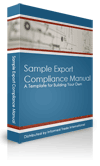There are numerous provisions in the ITAR that carve out exemptions for specific persons and entities to reduce the administrative burden of having to register as a broker (and subsequently obtain an approval for brokering activities). US Connection Predecessor to Registration Broker registration requirements require substantial links to the United States. They apply only […]
Posted on October 7th, 2016 by admin
Filed under: ITAR | Comments Off on Exemptions from the Registration Requirement
Under the International Traffic in Arms Regulations (ITAR) implemented and enforced by the Directorate of Defense Trade Controls (DDTC) of the Department of State, “brokers” of defense articles and defense services are required to register with and obtain the approval of the DDTC prior to engaging in the business of brokering. If you are […]
Posted on October 7th, 2016 by admin
Filed under: ITAR | Comments Off on ITAR Brokering Registration Regulations and Compliance
Effects of the New Rules The BIS and State Department intend for these DCS revisions to have significant positive effects on exporters, and on export regulation generally. Specifically, their hope is that the final rule revisions will help minimize the compliance burden for exporters, and the complexity of the export control process overall. Recipient […]
Posted on September 1st, 2016 by admin
Filed under: EAR, ITAR | Comments Off on Effects of the New DCS Rules
The final rules issued by the BIS and State Department – and effective as of November 2016 – alter the text of the existing EAR and ITAR regulations to better harmonize their separate DCS requirements. Commercial invoice only. The new rules no longer require a DCS on several different export control documents. Instead, under […]
Posted on September 1st, 2016 by admin
Filed under: EAR, ITAR | Comments Off on Changes Made to Harmonize the DCS provisions
How is the pre-existing DCS paradigm frustrating for exporters? The purpose of a DCS is to notify international parties as to the compliance of the exported defense article with applicable EAR and ITAR regulation, and to ensure that the relevant parties are further notified as to the illegality of diverting the exported article. […]
Posted on September 1st, 2016 by admin
Filed under: EAR, ITAR | Comments Off on How is the pre-existing DCS paradigm frustrating for exporters?
New Revisions to the EAR and ITAR to Harmonize Destination Control Statements On August 17, 2016, as part of the President’s Export Control Reform initiative, the Bureau of Industry and Security (BIS) and the US Department of State issued final rules revising the destination control statement (DCS) requirements in the Export Administration Regulations (EAR) […]
Posted on September 1st, 2016 by admin
Filed under: EAR, ITAR, News | Comments Off on New Revisions to the EAR and ITAR to Harmonize Destination Control Statements
The State Department works with various other agencies (e.g., US Customs, Department of Defense) and with foreign governments and their agencies to ensure compliance, both before and after shipment, through extensive monitoring programs. If there is an ITAR violation – for example, if the arms export is transferred to a prohibited end-user – then you […]
Posted on August 15th, 2016 by admin
Filed under: ITAR | Comments Off on Failure to Comply – Civil and Criminal Penalties
Under ITAR section 122.1(a), an arms exporter must first register with the DDTC and receive State Department approval of their license application. Registration is a pre-requisite for licensing, and approval of the license application entitles the would-be arms exporter to important export privileges. Additional registration requirements and exemptions Under ITAR section 120.25, an arms exporter-applicant […]
Posted on August 8th, 2016 by admin
Filed under: ITAR | Comments Off on Licensing and Registration
What are the basic rights and obligations of arms exporters under current federal law? US-based arms exporters are legally entitled to sell, transfer, and export arms and other defense articles to foreign recipients – though these transfers may be subject to numerous regulatory controls. Exportation of defense articles is seen as a crucial component in […]
Posted on August 1st, 2016 by admin
Filed under: ITAR | Comments Off on Exporting Arms and other Defense Articles – an Introduction to ITAR Compliance
January 16, 2014 Federal Register notice. The BIS is allotting until March 17, 2014 for both the general public and Federal agencies to address the 5 year maintaining practice on export records regarding “memoranda, correspondence, contracts, invitations to bid, books of account, financial records, restrictive trade practice or boycott documents and reports.” The BIS is […]
Posted on January 21st, 2014 by admin
Filed under: ITAR | Comments Off on 5 year maintaining practice on export records


